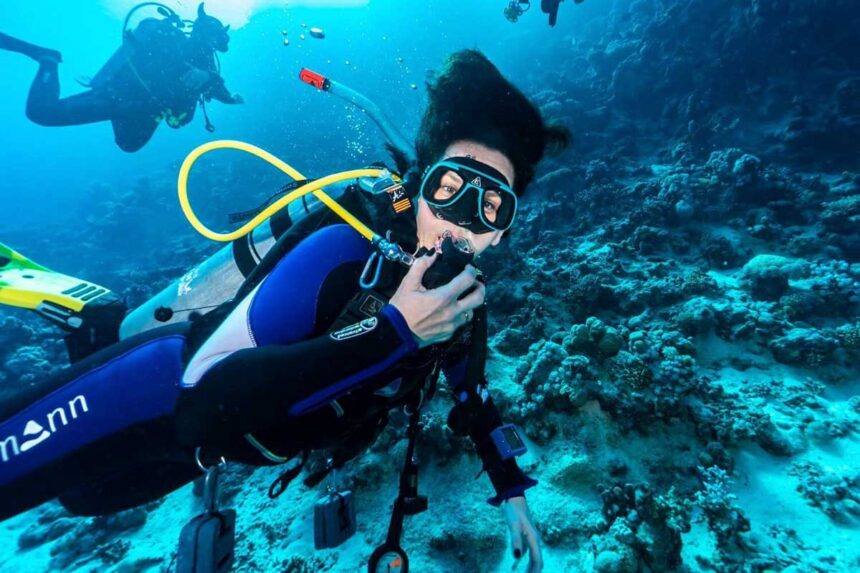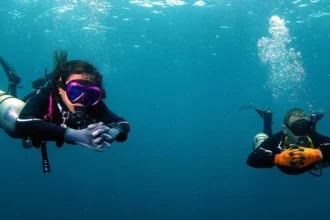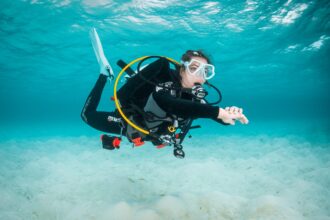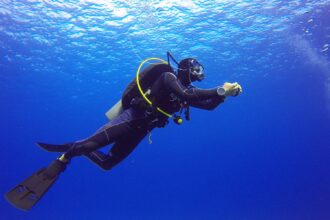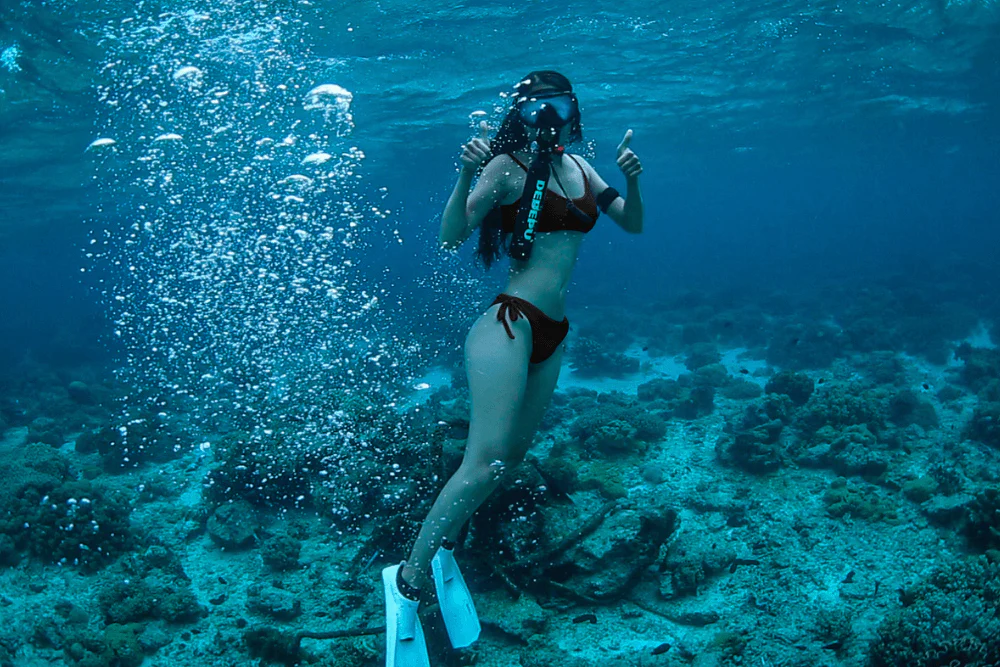If you’re dreaming of exploring colorful reefs, swimming with marine life, and experiencing the magic of the underwater world, the first step is choosing the best scuba diving courses for beginners. With so many certifications, agencies, and training options available, it can feel overwhelming to decide where to start — especially if you’re nervous or unsure about swimming, costs, or course duration.
- What Is the First Scuba Diving Course for Beginners?
- Types of Scuba Diving Certification Levels Explained
- Scuba Diving Course Fees for Beginners (India, Thailand & Other Countries)
- Scuba Diving Course Duration — How Long Does It Take?
- SSI vs PADI — Which Is Better for Beginners?
- What to Expect in Your First Scuba Diving Class
- What Does 🤙 Mean in Diving?
- Best Scuba Diving Courses for Beginners Near Me
- Best Scuba Diving Courses for Beginners in India
- Free or Low-Cost Beginner Scuba Diving Courses
- Scuba Diving Professional Courses After Beginner Level
- FAQs — People Also Ask
- 💬 Final Thoughts
This comprehensive guide breaks down everything a beginner needs to know, including PADI vs SSI, certification levels, training steps, course fees in India and abroad, and the first diving course you should take. Whether you are a student, adventure traveler, or first-time diver, this guide will help you make the right choice.
What Is the First Scuba Diving Course for Beginners?
The very first scuba diving certification for beginners is the Open Water Diver course. It is offered by both major diving agencies:
- PADI Open Water Diver
- SSI Open Water Diver
Both certifications are globally recognized and allow you to dive up to 18 meters (60 feet) anywhere in the world.
Beginner Requirements
- Minimum age: 10–12 years (depending on agency)
- Ability to float/swim for 10 minutes
- No major medical conditions
- Comfort in water
The Open Water course is considered the gold standard for beginners because it teaches essential safety skills, underwater communication, buoyancy, gear handling, and practical dive planning.
Types of Scuba Diving Certification Levels Explained
To understand your diving journey, here’s a simple breakdown of all major PADI and SSI certification levels, from beginner to professional.
Beginner Scuba Certification Levels
| Level | PADI Certification | SSI Certification | Depth Limit |
|---|---|---|---|
| 1 | Discover Scuba Diving (DSD) | Try Scuba | Up to 6–12 m |
| 2 | Open Water Diver | Open Water Diver | Up to 18 m |
| 3 | Adventure Diver | Advanced Adventurer | Up to 30 m |
Discover Scuba Diving (DSD)
A short 1-day program for complete beginners. You do NOT receive a certification card (C-card) but it introduces you to scuba basics.
Open Water Diver (OWD)
This is your first true certification. You receive a license that is valid for life.
Intermediate & Professional Levels
After completing the Open Water Diver course, you can progress to:
- Advanced Open Water Diver (depth up to 30 meters)
- Rescue Diver
- Divemaster
- Instructor (IDC) – For professional divers
Professional courses are ideal for those planning to work in dive centers, on liveaboards, or as underwater guides.
Scuba Diving Course Fees for Beginners (India, Thailand & Other Countries)
One of the biggest concerns for beginners is course cost, especially when comparing India with international destinations like Thailand, Bali, and Maldives.
Here’s a full breakdown.
Scuba Diving Course Fees in India
India has become one of the most affordable places to get certified with world-class instructors.
| Location | Average Price (INR) | Duration | Notes |
|---|---|---|---|
| Goa | ₹18,000–₹25,000 | 3–4 days | Budget friendly |
| Andaman | ₹20,000–₹28,000 | 4–5 days | Best visibility |
| Pondicherry | ₹18,000–₹24,000 | 3–4 days | Artificial reef diving |
| Lakshadweep | ₹24,000–₹32,000 | 4–5 days | Premium location |
Price includes:
✔ Instructor
✔ Gear rental
✔ Theory sessions
✔ Pool practice
✔ 4 Open Water dives
✔ Certification fees
Scuba Diving Course Fees in Thailand
Thailand is one of the cheapest places globally to do scuba certification.
| Location | Average Price (INR Equivalent) | Notes |
|---|---|---|
| Koh Tao | ₹12,000–₹18,000 | Cheapest in Asia |
| Phuket | ₹18,000–₹28,000 | More premium |
| Krabi | ₹16,000–₹24,000 | Great visibility |
Why Thailand is cheaper:
- Higher competition between dive shops
- Tourism-driven pricing
- Larger class sizes
Global Cost Comparison Table
| Country | Price Range (INR Equivalent) |
|---|---|
| India | ₹18,000–₹28,000 |
| Thailand | ₹12,000–₹24,000 |
| Philippines | ₹15,000–₹25,000 |
| Maldives | ₹35,000–₹50,000 |
| Malaysia | ₹18,000–₹28,000 |
Scuba Diving Course Duration — How Long Does It Take?
The beginner Open Water course usually takes 3 to 5 days, depending on the training center and learning speed.
1. Online or Classroom Theory – 1 Day
- Basics of buoyancy
- Equalization techniques
- Dive planning
- Equipment safety
2. Pool/Confined Water Sessions – 1 Day
Learn foundational skills like mask clearing, regulator recovery, and buoyancy control.
3. Open Water Dives – 2 Days
- 4 open-water training dives
- Maximum depth: 18 meters
- Certification evaluation
Fastest possible completion: 3 days
Recommended pace: 4–5 days
SSI vs PADI — Which Is Better for Beginners?
One of the most asked questions: “Is SSI or PADI better?”
Here’s the simple answer:
👉 Both are excellent, globally recognized, and accepted everywhere.
Differences at a glance
| Factor | PADI | SSI |
|---|---|---|
| Global Recognition | Excellent | Excellent |
| Course Structure | Slightly more rigid | More flexible |
| Online Training | Paid modules | Free digital learning |
| Cost | Usually higher | Usually cheaper |
| Certifications Accepted Worldwide? | Yes | Yes |
Which one should beginners choose?
- Choose PADI if you want premium training with more structured content.
- Choose SSI if you prefer flexibility and a more budget-friendly option.
Both will qualify you equally for future dive training.
What to Expect in Your First Scuba Diving Class
If you’re nervous, excited, or unsure about what the first day looks like, here’s what typically happens:
Safety Briefing
Your instructor explains:
- Breathing techniques
- Pressure equalizing
- Emergency responses
- Hand signal communication
Equipment Training
You’ll learn about:
- BCD (Buoyancy Control Device)
- Weights
- Wetsuits
- Mask and snorkel
- Regulators
Confined Water Practice
Practice essential beginner skills such as:
- Mask clearing
- Regulator removal/recovery
- Buoyancy and hovering
- Finning techniques
What Does 🤙 Mean in Diving?
Underwater, verbal communication isn’t possible, so divers use hand signals.
The 🤙 “Shaka” sign typically means:
👉 “Everything is good” or “Relax, enjoy the dive.”
It’s also used as a friendly signal between divers.
Best Scuba Diving Courses for Beginners Near Me
If you’re searching “scuba diving courses near me,” here’s what to look for:
✔ Choose a certified agency
- PADI
- SSI
- NAUI
- RAID
✔ Verify instructor credentials
- Check for IDC or Divemaster qualifications
- Look at reviews
- Inspect equipment quality
✔ Check course inclusions
- Pool training?
- Gear rental?
- Certification fees?
- E-learning included?
✔ Ideal class size
2–4 students per instructor is best for beginners.
Best Scuba Diving Courses for Beginners in India
India offers outstanding beginner-friendly diving sites with ideal conditions.
Top Beginner Training Destinations
- Havelock Island (Andaman) – Best visibility
- Neil Island (Andaman) – Calm waters
- Goa – Budget-friendly
- Pondicherry – Wreck & artificial reef sites
- Lakshadweep – Premium island diving
What Makes an Indian Dive Course Beginner-Friendly?
- Clear visibility (5–25 meters)
- Warm waters (28°C average)
- Slow currents
- Affordable pricing
- Experienced instructors
Free or Low-Cost Beginner Scuba Diving Courses
A common beginner search: “Best scuba diving courses for beginners free”
Here’s the truth:
You cannot get a real scuba diving certification for free.
Certification requires professional instructors, equipment, pool access, and safety protocols.
However, you can access free learning:
Free Beginner Options
- Online theory videos
- PADI/SSI trial modules
- Intro sessions without certification
- Free snorkeling classes (some dive shops offer this)
Great for understanding basics before paying for an Open Water course.
Scuba Diving Professional Courses After Beginner Level
If you’ve completed your Open Water course and want to build a career in scuba:
Professional Course Path
- Advanced Open Water Diver
- Rescue Diver
- Divemaster (DM)
- Instructor (IDC)
- Specialty Courses
- Deep diving
- Wreck diving
- Night diving
- Nitrox diving
Professional diving can lead to careers as:
- Resort dive instructors
- Underwater photographers
- Marine researchers
- Dive center managers
- Liveaboard guides
FAQs — People Also Ask
1. How long does it take to become a certified diver?
It takes 3–5 days to complete the PADI or SSI Open Water Diver course.
2. Do you need to know swimming for scuba diving?
Yes. You must be able to swim 200 meters (any style) and float for 10 minutes.
3. Is scuba diving safe for beginners?
Yes, scuba diving is very safe when done with certified instructors and proper equipment.
4. How much does PADI certification cost in India?
Between ₹18,000 and ₹28,000, depending on the location and dive center.
5. What age is best to start scuba diving?
Children can start from 10–12 years old with junior certifications.
💬 Final Thoughts
Starting your scuba diving journey is one of the most exciting decisions you’ll ever make. The best scuba diving courses for beginners offer a perfect mix of safety, adventure, and skill-building, ensuring you can explore the underwater world with confidence.
Whether you choose India, Thailand, or another dream destination, a certified Open Water course opens the door to a lifetime of adventure, marine exploration, and endless ocean memories.
If you’re ready to begin your journey, explore the guides on ScoobadiveGuide and take your first step toward becoming a certified diver.
